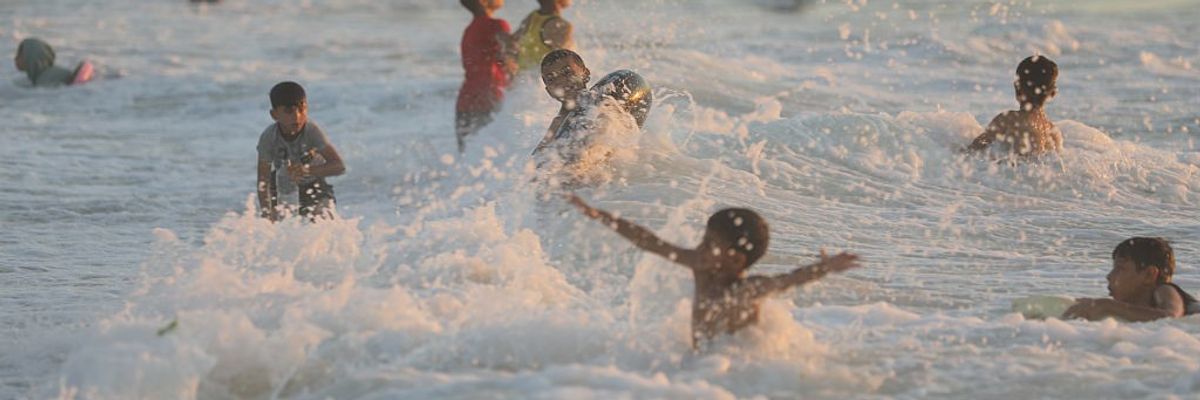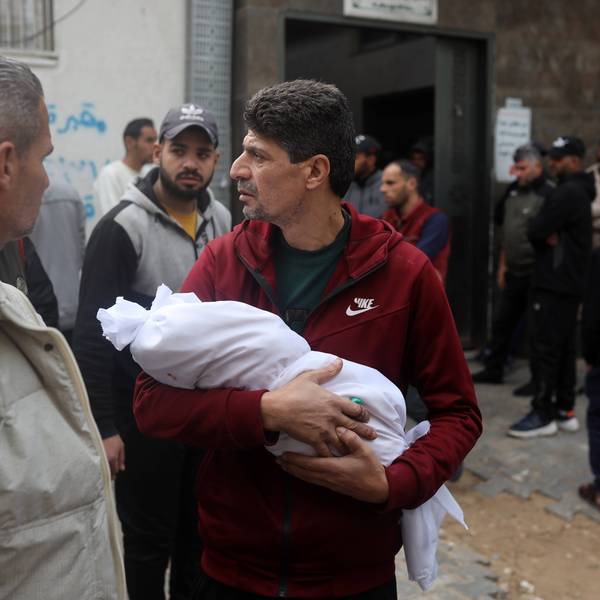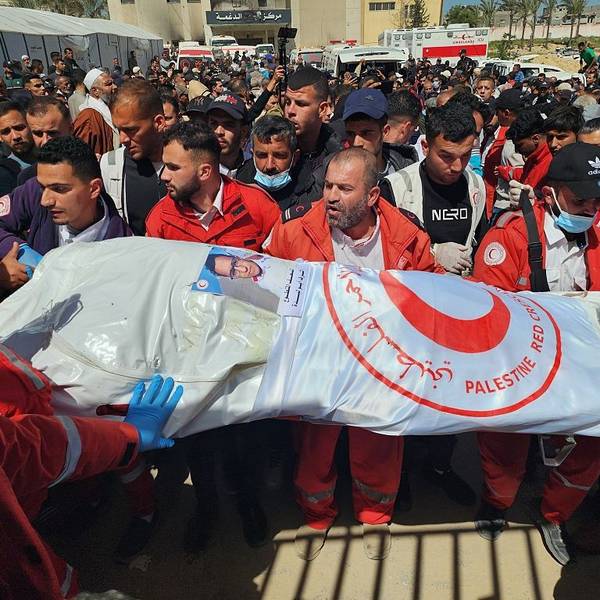
Palestinian children play in the Mediterranean Sea in Gaza City, Palestine on July 4, 2025.
In Act of 'Brutal Sadism,' Israel Bans Gazans From Entering Sea Under Pain of Death
"This is not about security," said the head of Gaza's fishers' union. "It's economic, social, and psychological warfare, a weapon of slow, deliberate suffocation."
Israel has warned Gazans to stay out of the Mediterranean Sea or risk getting killed under wartime restrictions that critics say serve no security purpose and are meant to deprive Palestinians of a key source of sustenance—and respite from the horrific realities of 21 months of constant death and destruction.
"Strict security restrictions have been imposed in the maritime area adjacent to Gaza—entry to the sea is prohibited," Israel Defense Forces (IDF) Arabic language spokesperson Avichay Adraee wrote on the social media site X Saturday. "This is a call to fishermen, swimmers, and divers—refrain from entering the sea. Entering the beach and waters along the entire Gaza Strip endangers your lives."
While Israel has imposed a maritime blockade on Gaza since 2007 following Hamas' victory in legislative elections and subsequent takeover of the coastal enclave, restrictions were tightened after the October 7, 2023 attack as part of the "complete siege" that has caused deadly malnutrition throughout the strip, where Israel's 646-day U.S.-backed onslaught has left more than 211,000 Palestinians dead, maimed, or missing, according to the Gaza Health Ministry.
However, the IDF appears to have not enforced the post-October 7 ban on entering the sea against swimmers and bathers. Only Palestinian fishers have been targeted, with more than 210 killed since October 2023, according to United Nations data.
"We live off the sea. If there's no fishing, we don't eat," Munthir Ayash, a 52-year-old fisher from Gaza City, told the Emirati newspaper The National Monday. "Me, my five sons, and their families—45 people in total—depend entirely on the sea. With it closed, we face starvation."
It is unclear why the IDF issued Saturday's warning, which came amid excessive heat warnings as temperatures rose to over 30°C (86°F). With Gaza's infrastructure obliterated by 21 months of Israeli onslaught and safe running water in severe shortage, the Mediterranean Sea provided a place to cool off and clean up.
"I used to go every day. The sea was where I bathed, where I relaxed, where I ran from the horror of war," Ibrahim Dawla, a 26-year-old Palestinian man forcibly displaced from Gaza City's Zaytun, told The National. "Now even that's gone."
Rajaa Qudeih, a 31-year-old mother of two from Deir al-Balah, told the Israeli newspaper Haaretz Sunday: "I'm literally dizzy from hunger, thirst, and the heat. Gaza is going through the worst famine, we haven't eaten, and we can't even find a piece of bread."
"The sea was the only outlet left. If they kill us for going there, maybe that would be easier than this slow death," she continued. "Still, I fear for my children. My oldest is 9. How can I convince him that swimming in the sea could get him killed?"
"We are camped by the sea," Qudeih added. "Where else can we go? Are they going to ban the air from us next?"
The IDF claims the maritime blockade is a security measure aimed at preventing weapons from being smuggled into Gaza.
However, Zakaria Bakr, head of the Palestinian Fishermen's Syndicate in Gaza, and many other residents of the embattled enclave believe there is another reason why Israel is prohibiting them from entering the sea.
"This is not about security. It's economic, social, and psychological warfare; a weapon of slow, deliberate suffocation," he told The National.
Dawla said that "people here die a million times every hour; we needed the sea just to feel human again, even if only for a few minutes. And they knew that. That's why they shut it down."
"We called it our last breathing space. We knew it was dangerous, but it was the only place we had left," he added. Now, "I haven't gone for two days. None of my friends have either. We're all afraid we'll be shot just for standing there."
Ayash said of Israel: "They want to take everything. They want to erase us."
"But the sea is ours," he added. "The land is ours. No matter how hard they try, it will stay ours."
Palestine defenders around the world also condemned the IDF policy.
"There can be no possible military or security reason for banning the people of Gaza from entering the sea—except to satisfy the brutal sadism of the IDF," argued Australian journalist and commentator Mike Carlton.
An Urgent Message From Our Co-Founder
Dear Common Dreams reader, The U.S. is on a fast track to authoritarianism like nothing I've ever seen. Meanwhile, corporate news outlets are utterly capitulating to Trump, twisting their coverage to avoid drawing his ire while lining up to stuff cash in his pockets. That's why I believe that Common Dreams is doing the best and most consequential reporting that we've ever done. Our small but mighty team is a progressive reporting powerhouse, covering the news every day that the corporate media never will. Our mission has always been simple: To inform. To inspire. And to ignite change for the common good. Now here's the key piece that I want all our readers to understand: None of this would be possible without your financial support. That's not just some fundraising cliche. It's the absolute and literal truth. We don't accept corporate advertising and never will. We don't have a paywall because we don't think people should be blocked from critical news based on their ability to pay. Everything we do is funded by the donations of readers like you. Will you donate now to help power the nonprofit, independent reporting of Common Dreams? Thank you for being a vital member of our community. Together, we can keep independent journalism alive when it’s needed most. - Craig Brown, Co-founder |
Israel has warned Gazans to stay out of the Mediterranean Sea or risk getting killed under wartime restrictions that critics say serve no security purpose and are meant to deprive Palestinians of a key source of sustenance—and respite from the horrific realities of 21 months of constant death and destruction.
"Strict security restrictions have been imposed in the maritime area adjacent to Gaza—entry to the sea is prohibited," Israel Defense Forces (IDF) Arabic language spokesperson Avichay Adraee wrote on the social media site X Saturday. "This is a call to fishermen, swimmers, and divers—refrain from entering the sea. Entering the beach and waters along the entire Gaza Strip endangers your lives."
While Israel has imposed a maritime blockade on Gaza since 2007 following Hamas' victory in legislative elections and subsequent takeover of the coastal enclave, restrictions were tightened after the October 7, 2023 attack as part of the "complete siege" that has caused deadly malnutrition throughout the strip, where Israel's 646-day U.S.-backed onslaught has left more than 211,000 Palestinians dead, maimed, or missing, according to the Gaza Health Ministry.
However, the IDF appears to have not enforced the post-October 7 ban on entering the sea against swimmers and bathers. Only Palestinian fishers have been targeted, with more than 210 killed since October 2023, according to United Nations data.
"We live off the sea. If there's no fishing, we don't eat," Munthir Ayash, a 52-year-old fisher from Gaza City, told the Emirati newspaper The National Monday. "Me, my five sons, and their families—45 people in total—depend entirely on the sea. With it closed, we face starvation."
It is unclear why the IDF issued Saturday's warning, which came amid excessive heat warnings as temperatures rose to over 30°C (86°F). With Gaza's infrastructure obliterated by 21 months of Israeli onslaught and safe running water in severe shortage, the Mediterranean Sea provided a place to cool off and clean up.
"I used to go every day. The sea was where I bathed, where I relaxed, where I ran from the horror of war," Ibrahim Dawla, a 26-year-old Palestinian man forcibly displaced from Gaza City's Zaytun, told The National. "Now even that's gone."
Rajaa Qudeih, a 31-year-old mother of two from Deir al-Balah, told the Israeli newspaper Haaretz Sunday: "I'm literally dizzy from hunger, thirst, and the heat. Gaza is going through the worst famine, we haven't eaten, and we can't even find a piece of bread."
"The sea was the only outlet left. If they kill us for going there, maybe that would be easier than this slow death," she continued. "Still, I fear for my children. My oldest is 9. How can I convince him that swimming in the sea could get him killed?"
"We are camped by the sea," Qudeih added. "Where else can we go? Are they going to ban the air from us next?"
The IDF claims the maritime blockade is a security measure aimed at preventing weapons from being smuggled into Gaza.
However, Zakaria Bakr, head of the Palestinian Fishermen's Syndicate in Gaza, and many other residents of the embattled enclave believe there is another reason why Israel is prohibiting them from entering the sea.
"This is not about security. It's economic, social, and psychological warfare; a weapon of slow, deliberate suffocation," he told The National.
Dawla said that "people here die a million times every hour; we needed the sea just to feel human again, even if only for a few minutes. And they knew that. That's why they shut it down."
"We called it our last breathing space. We knew it was dangerous, but it was the only place we had left," he added. Now, "I haven't gone for two days. None of my friends have either. We're all afraid we'll be shot just for standing there."
Ayash said of Israel: "They want to take everything. They want to erase us."
"But the sea is ours," he added. "The land is ours. No matter how hard they try, it will stay ours."
Palestine defenders around the world also condemned the IDF policy.
"There can be no possible military or security reason for banning the people of Gaza from entering the sea—except to satisfy the brutal sadism of the IDF," argued Australian journalist and commentator Mike Carlton.
- 'Conquer, Kick Out, Resettle': Israel's Far-Right Gathers to Plan Ethnic Cleansing of Gaza ›
- 12 Palestinians Drown Trying to Retrieve Airdropped Gaza Aid From Sea ›
- At Least 95 Palestinians Killed in Israeli Attacks Including Massacres at Beach Café, Aid Points ›
- Opinion | Why We’re Not Allowed to See Gaza | Common Dreams ›
Israel has warned Gazans to stay out of the Mediterranean Sea or risk getting killed under wartime restrictions that critics say serve no security purpose and are meant to deprive Palestinians of a key source of sustenance—and respite from the horrific realities of 21 months of constant death and destruction.
"Strict security restrictions have been imposed in the maritime area adjacent to Gaza—entry to the sea is prohibited," Israel Defense Forces (IDF) Arabic language spokesperson Avichay Adraee wrote on the social media site X Saturday. "This is a call to fishermen, swimmers, and divers—refrain from entering the sea. Entering the beach and waters along the entire Gaza Strip endangers your lives."
While Israel has imposed a maritime blockade on Gaza since 2007 following Hamas' victory in legislative elections and subsequent takeover of the coastal enclave, restrictions were tightened after the October 7, 2023 attack as part of the "complete siege" that has caused deadly malnutrition throughout the strip, where Israel's 646-day U.S.-backed onslaught has left more than 211,000 Palestinians dead, maimed, or missing, according to the Gaza Health Ministry.
However, the IDF appears to have not enforced the post-October 7 ban on entering the sea against swimmers and bathers. Only Palestinian fishers have been targeted, with more than 210 killed since October 2023, according to United Nations data.
"We live off the sea. If there's no fishing, we don't eat," Munthir Ayash, a 52-year-old fisher from Gaza City, told the Emirati newspaper The National Monday. "Me, my five sons, and their families—45 people in total—depend entirely on the sea. With it closed, we face starvation."
It is unclear why the IDF issued Saturday's warning, which came amid excessive heat warnings as temperatures rose to over 30°C (86°F). With Gaza's infrastructure obliterated by 21 months of Israeli onslaught and safe running water in severe shortage, the Mediterranean Sea provided a place to cool off and clean up.
"I used to go every day. The sea was where I bathed, where I relaxed, where I ran from the horror of war," Ibrahim Dawla, a 26-year-old Palestinian man forcibly displaced from Gaza City's Zaytun, told The National. "Now even that's gone."
Rajaa Qudeih, a 31-year-old mother of two from Deir al-Balah, told the Israeli newspaper Haaretz Sunday: "I'm literally dizzy from hunger, thirst, and the heat. Gaza is going through the worst famine, we haven't eaten, and we can't even find a piece of bread."
"The sea was the only outlet left. If they kill us for going there, maybe that would be easier than this slow death," she continued. "Still, I fear for my children. My oldest is 9. How can I convince him that swimming in the sea could get him killed?"
"We are camped by the sea," Qudeih added. "Where else can we go? Are they going to ban the air from us next?"
The IDF claims the maritime blockade is a security measure aimed at preventing weapons from being smuggled into Gaza.
However, Zakaria Bakr, head of the Palestinian Fishermen's Syndicate in Gaza, and many other residents of the embattled enclave believe there is another reason why Israel is prohibiting them from entering the sea.
"This is not about security. It's economic, social, and psychological warfare; a weapon of slow, deliberate suffocation," he told The National.
Dawla said that "people here die a million times every hour; we needed the sea just to feel human again, even if only for a few minutes. And they knew that. That's why they shut it down."
"We called it our last breathing space. We knew it was dangerous, but it was the only place we had left," he added. Now, "I haven't gone for two days. None of my friends have either. We're all afraid we'll be shot just for standing there."
Ayash said of Israel: "They want to take everything. They want to erase us."
"But the sea is ours," he added. "The land is ours. No matter how hard they try, it will stay ours."
Palestine defenders around the world also condemned the IDF policy.
"There can be no possible military or security reason for banning the people of Gaza from entering the sea—except to satisfy the brutal sadism of the IDF," argued Australian journalist and commentator Mike Carlton.
- 'Conquer, Kick Out, Resettle': Israel's Far-Right Gathers to Plan Ethnic Cleansing of Gaza ›
- 12 Palestinians Drown Trying to Retrieve Airdropped Gaza Aid From Sea ›
- At Least 95 Palestinians Killed in Israeli Attacks Including Massacres at Beach Café, Aid Points ›
- Opinion | Why We’re Not Allowed to See Gaza | Common Dreams ›

